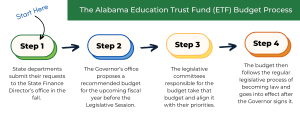The Alabama Legislature convenes for the 2023 Legislative Session on Tuesday, March 7th, and the Education Trust Fund budget, as always, will be a top priority.
THE EDUCATION TRUST FUND PROCESS
One of the only constitutionally-mandated actions the legislature must take while in session is to pass two budgets: the Education Trust Fund and the State General Fund. The Education Trust Fund budget, or ETF, is the largest of the two. It funds all public schools in the state, including K-12 school systems, two-year colleges, and public four-year colleges and universities. Last year, the Legislature appropriated almost $8.3 billion for the current fiscal year. Comparatively, the General Fund was only $2.7 billion.
This year, the Legislature will appropriate funds for Fiscal Year 2023-2024, which starts in October of 2023. However, the process of creating the budget has been well underway for months. Here is the process:
- STEP 1: State departments, such as the Alabama State Department of Education or the Alabama Department of Early Childhood Education submit their requests to the State Finance Director’s office in the fall.
- STEP 2: Usually around the time that the Legislature convenes in the spring, the Governor’s office proposes a recommended budget for the upcoming fiscal year.
- STEP 3: Then, the legislative committees responsible for the budget (Finance and Taxation Education in the Senate, or Ways and Means Education in the House of Representatives) take that budget and align it with their priorities.
- STEP 4: The budget then follows the regular legislative process of becoming law, and goes into effect after the Governor signs it.
- STEP 5: Funds are distributed to their respective entities, including colleges, universities, local school systems, state departments, and other organizations

WHAT IS THE EDUCATION TRUST FUND?
The bill referred to as the Education Trust Fund includes funding for public higher education and public PreK-12 education. This covers the funding that goes to local school districts directly, funding for the Alabama State Department of Education (ALSDE) and other state agencies, and various educational programs offered by nongovernmental organizations.
A significant part of the ETF is called the Foundation Program. This pot of money is allocated on a formula basis to school systems every year for the core functions of running K-12 schools: teacher salaries, instructional materials, transportation, and other necessary resources for educating Alabama’s students. Foundation Program funding is allocated to districts based on the number of resources they need, which is estimated from the number of students they have. Out of an $8.3 billion ETF budget, $4.8 billion (58%) is allocated through the foundation program.
In addition, local school systems also receive funding through the ALSDE for specific uses, such as mental health service coordinators, special education), reading coaches to support the Alabama Literacy Act, and much more (you can see the ETF spreadsheet for FY2023, which lays out all the line items in the ETF and their amounts, here).
WHAT ELSE IS FUNDED?
The ETF is normally brought as part of a package of seven or more bills that fund public education. Last year, these bills were:
- HB135, which is the main ETF bill
- HB136, which provided a salary increase to public education employees
- HB137, which gave a one-time bonus to retired teachers in the state
- HB138, which was a supplemental appropriations bill that distributed leftover money from FY2021 funds
- HB140, which funds Tuskegee University
- HB141, which funds Lyman Ward Military Academy
- HB142, which funds Talladega College
- HB267, which was another supplemental appropriations bill that distributed funds from FY2022’s Advancement and Technology fund to colleges and school systems specifically for one-time expenses like repairs and maintenance of public school facilities, school technology, and other similar costs
WHAT’S NEXT?
In the last few years, despite the COVID-19 pandemic, the tax base for the ETF has grown significantly, leading to record-breaking budgets being passed. The FY2023 ETF budget totaled $8.26 billion, following FY2022’s $7.6 billion ETF. Right now, the ETF has a surplus of $2.7 billion that legislators will have to decide how to spend this session. Check out last year’s Budget Watch to read about what priorities legislators have had in the past, and check back soon for a new Budget Watch covering Alabama education spending in this unprecedented time.

0 Comments on "AL Legislative Session 101: The Education Trust Fund Budget"